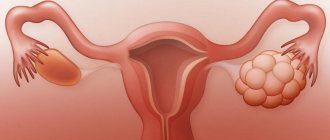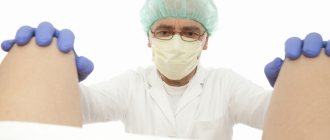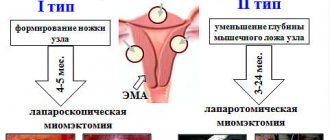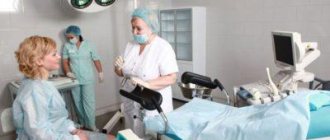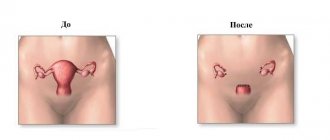What is the essence of HRT?
What is HRT after removal of the uterus and ovaries? This is a therapeutic course, the purpose of which is to restore hormonal levels in the body by replacing missing hormones.
If the uterus is removed, a woman experiences premature menopause caused by a lack of hormones. This condition can be accompanied by depression and fatigue; it often prevents a woman from living a normal life - she becomes irritable, sleeps poorly, and cannot do her usual work. HRT helps reduce the severity of menopausal symptoms. In addition, taking hormonal medications helps prevent the occurrence of osteochondrosis and cardiovascular diseases, which are common manifestations of menopause.
Early symptoms of surgical menopause
For stasis, we note that after removal of the ovaries, menopause occurs faster, and its symptoms are more intense in comparison with how menopause manifests itself after the uterus is removed. A different situation arises with bilateral removal of the ovaries and uterus. Here the symptoms appear almost immediately and with greater force.
If we take the severity of the negative consequences of surgical menopause, then everything will depend on the general health of the woman and previous illnesses. But still, the number of symptoms in each case is different, and it does not hurt to familiarize yourself with all possible conditions.
Manifestation of tides
If during the natural decline of the reproductive system the body manages to adapt to the changes, then surgical menopause manifests itself in the form of sudden sensations of heat faster and more intense just a few days after the operation.
May manifest itself through:
- sudden changes in temperature in the face, neck, chest;
- increased sweating;
- attacks of chills;
- redness of the face and neck area;
- increased blood pressure (sudden jumps are possible).
Hot flashes in women can occur on average 30-50 times a day, and the symptoms themselves may not go away for up to five years. In addition, hot flashes have a direct impact on a woman’s psycho-emotional well-being, thereby provoking other disorders.
Autonomic disorders
Occurs a few weeks after surgery. The lack of androgens and estrogens affects the functioning of the autonomic system.
Such violations can manifest themselves in the form of:
- headaches that can develop into migraines;
- dizziness (very rarely loss of consciousness);
- tachycardia;
- neuralgic problems;
- sudden numbness of the limbs (with or without tingling);
- a sharp decrease in working capacity;
- general weakness (throughout the day or certain periods of time);
- rapid fatigue.
According to statistics, such problems occur in 60% of patients, and do not stop until the end of menopause.
Psycho-emotional state disorder
After amputation of reproductive organs, a woman experiences extreme stress, which can manifest itself in various ways:
- impulsiveness;
- sharp reaction to positive/negative stimuli;
- variable outbursts of anger;
- severe irritability;
- tearful mood;
- constant feeling of anxiety;
- the emergence of various phobias;
- prolonged depression;
- decreased sexual desire.
Whatever one may say, as a result of surgical removal of the ovaries and uterus, women develop a feeling of insecurity regarding their attractiveness and usefulness. It is this problem that needs to be dealt with first, because psycho-emotional disorders can develop into more serious pathologies. In addition, mental problems do not allow the body to adapt to changes, increasing other unpleasant symptoms of menopause after removal of the uterus. The faster the emotional background can be stabilized, the faster the woman will be able to return to her usual way of life.
Thinning of the mucous layer
Everyone knows that estrogen is responsible for the normal state of the mucous membranes of the reproductive system. Both the fallopian tubes and the vagina have their own mucous membrane, which after menopause thins and dries out.
As a result, during sex during menopause, pain and discomfort occur. A woman refuses sexual intercourse and may also become depressed because of this. But if you solve this problem, you can avoid misunderstandings with your partner, and also prevent the problem from escalating into a serious relationship crisis.
Cognitive problems
The lack of the main sex hormone affects brain function. This especially affects the part of the brain that controls cognitive processes.
Against this background, the following often occurs:
- deterioration in the ability to perceive various types of information;
- memory impairment;
- problems with remembering new data.
These symptoms intensify under the influence of psycho-emotional disorders. That is why menopause after surgery requires complex treatment, which should include not only various medications, but also various exercises, meditation, and psychoanalysis. It is also important to organize a positive atmosphere around yourself, eliminating the maximum number of negative factors.
The need for hormonal therapy and indications for its implementation
Do I need to take hormonal medications after surgery? In most cases, this event is necessary so that the woman feels normal and endures the postoperative period more easily.
The amount of medication used depends on whether the ovaries were removed. Moreover, if during the operation only the uterus was removed, but the ovaries remained intact, the amount of hormones taken should be minimal. However, even if they are not damaged during the operation, due to the removal of the uterus, blood circulation in them is disrupted, so they begin to produce less hormones. So HRT must be carried out without fail.
Usually you need to start taking hormones after removal of the uterus no earlier than 90 days after the operation. It is necessary for the body to fully recover. Moreover, during the recovery period, the woman takes certain medications that are not recommended to be combined with hormonal drugs.
But it must be taken into account that in certain cases the use of HRT is contraindicated. It is prohibited to take hormonal drugs if:
- The patient has cancer, or she previously had cancer, but was successfully cured of it. Taking hormonal drugs can lead to relapse of the disease, as well as faster division of atypical cells and progression of cancer.
- There are vascular pathologies and a high probability of thrombosis.
- The woman has been smoking or suffering from alcohol addiction for a long time.
- Serious liver or kidney disease is observed. During exacerbation of chronic diseases of these organs, it is better to postpone HRT.
Typically, drugs containing estrogen are used during HRT. This hormone is produced normally in the ovaries. It is also recommended to include progestins in therapy, which reduce the likelihood of ovarian cancer (if they are preserved).
Hormonal levels after hysterectomy
The main factor in the disruption of hormone levels after surgery is a change in blood circulation in the ovaries. They are deprived of blood flow through the uterine arteries. This provokes nutritional deficiency (ischemia), stagnation of blood and lymphatic fluid. Because of this, their tissues are destroyed and their functions change:
- lack of ability to ovulate;
- the production of hormones decreases: estradiol, progesterone, testosterone;
- weakens interaction with the pituitary gland, which regulates hormonal levels
During the childbearing period, the functioning of the ovaries can gradually recover over time. In women after 40 years of age, and sometimes in younger women, early menopause occurs. Manifestations of postoperative syndrome are caused by estrogen deficiency.
Typical signs include:
- constant weakness, lethargy, low performance;
- sweating, hot flashes;
- depression;
- arterial hypertension, pressure changes;
- absent-mindedness, memory impairment;
- increased anxiety, irritability, tearfulness;
- rapid heartbeat, stabbing pain in the heart;
- poor tolerance to changes in external temperature and atmospheric pressure;
- insomnia;
- vaginal dryness, pain during sexual intercourse;
- increased body weight;
- urinary incontinence when laughing, coughing, tensing the abdominal muscles;
- frequent urination;
- prolapse of the vaginal walls;
- skin aging;
- hair loss;
- decreased sexual desire.
An important role is played by a change in a woman’s perception of her biological role, the formation of a feeling of inferiority, which negatively affects her overall well-being.
We recommend reading the article about vitamins for a woman’s hormonal levels. From it you will learn about the reasons for normalizing hormonal levels in women, vitamins for recovery, what cyclic vitamin therapy is and a diet for normalizing hormonal levels.
And here is more information about the hormone gonadotropin.
Use of medications
What medications should I take? Hormone replacement therapy involves the use of tablets, suppositories, solutions, ointments and gels. All of these drugs are quite effective. And the choice of a particular remedy depends on the required dose, as well as on the desire of the patient.
Pills
When the uterus is removed, the following medications are prescribed in the form of tablets:
1.Klimonorm. Available in the form of yellow or brown dragees. Contains estrogen and progesterone, which are necessary for the body at the onset of artificial menopause. The medicine is also suitable for HRT caused by true menopausal syndrome, which usually occurs after 45 years. Contraindicated for the treatment of women with diagnosed cancer. Take 1 tablet per day in the morning on an empty stomach, washing down the tablet with a small amount of liquid. The duration of therapy is 21 days, after which a seven-day break is taken. The cost of packaging the medicine is from 850 rubles.
Klimonorm
2. Femoston. The active ingredient of the drug is 17-beta-estradiol ester. Available in a package of 28 tablets. The medicine should be taken daily without interruption. One package is designed for one therapeutic course. Then a break is taken for a month, after which the pills are repeated. Femoston helps relieve symptoms of hormone deficiency and also prevents the development of osteoporosis. The cost of packaging the product is from 820 rubles.
3. Klymen. Contains estradiol valerate. It is a white dragee. Suitable for treating women whose uterus and ovaries have been removed, and after the operation symptoms of masculinity are observed: a large amount of hair appears on the body, the voice becomes rougher, etc. Take the drug daily in the morning, 1 tablet for 21 days, and then take a break for a week. After this, the course is repeated. The duration of treatment depends on the characteristics of the female body and is at least 2 years. In this case, one course lasts 3 months, after which a break is taken for 2-3 months.
In addition, tablets are recommended for patients who have skin problems. For example, they may complain about its excessive dryness, flaking, and wilting. Oral hormone intake is also indicated for women at risk of colon cancer.
Solutions (ampoules)
The administration of hormones by injection is very rare. One of the means used in the form of injections is Ginodin Depot. This is a drug that comes in the form of a sterile syringe, which contains an oily liquid - a substance with estrogen-progestin action. Injections need to be given daily. If the patient has poor metabolism, a break from the drug for a week is allowed.
The duration of therapy is determined by the attending physician and depends on how the woman tolerates the drug. It can cause some side effects: skin rashes, severe itching in the injection area, loss of appetite, insomnia, sudden weight loss. If any of these symptoms occur, you should immediately consult a doctor to adjust your therapy.
Vaginal suppositories
Vaginal suppositories have a local effect and have a positive effect on the vagina, preventing atrophy of its tissues. In addition, they reduce the severity of discomfort in the vaginal area, and also prevent the occurrence of infections and inflammations. They maintain vaginal acidity and microflora balance, which is also very important in the postoperative period.
The most common vaginal suppositories are:
- Colpotrophin. The active ingredient is promestriene. The drug is administered intravaginally and has a positive effect on the vaginal mucosa. Promestriene promotes the repair of postoperative tissue. 1 suppository is administered per day, and the duration of treatment is no more than 20 days. Side effects from using the drug are rare - itching and burning in the vaginal area may occur. The average price is about 900 rubles per package.
- Estriol-M. Contains estriol and additional components. Indicated to restore hormone levels in the blood. In addition, it relieves dryness in the vaginal area, which causes dyspareunia – painful sex – to disappear. During the first 4 weeks of therapy, the drug must be administered daily before bedtime. Then it is enough to use the drug 2 times a week. The duration of treatment is determined by the attending physician.
Hormonal preparations after removal of the uterus in the form of suppositories are suitable for patients with diabetes mellitus, as well as diseases of the intestines and gall bladder. Thus, the drug has a less pronounced effect on the organs of the digestive system.
Gels, creams and patches
One of the most popular products is Ornion cream, which contains estriol. A dispenser is sold in the package along with the medicine, making the cream easy to administer. In the first few weeks it is necessary to use the cream daily, and over time the frequency is reduced.
Estrogel is popular among transdermal gels in Russia. It is dosed with an applicator and distributed onto dry skin of the abdomen, left until completely dry. The duration of treatment is determined by the attending physician.
Estrogel
There are also special patches containing estradiol, for example, Klimara. The patch is glued to dry skin and left for a week. Then it will need to be changed.
General recommendations
It is impossible to overcome menopause if a woman does not adhere to a healthy lifestyle. Otherwise, treatment will be ineffective or even useless. Therefore, you should adhere to the following rules:
Create a positive environment
It is necessary to eliminate the maximum number of irritants, while simultaneously organizing optimal working and leisure conditions. It is important to constantly ventilate the apartment, especially the bedroom. Aromatherapy at home won't hurt either.
Eat a balanced diet
It is worth excluding fatty foods and large amounts of spices. Fruits, vegetables, fish, and nuts should predominate.
Fight excess weight
Obesity can cause problems with the heart, blood vessels and bones. In addition, extra pounds negatively affect one’s own perception, when a woman is already too strict with herself, and also feels inferior due to the loss of her reproductive organs.
Get rid of bad habits
Cigarettes, alcohol, strong coffee or tea should not be present in a woman’s life. In addition, bad habits can become a contraindication to taking hormonal medications, which are so necessary for hormonal imbalance.
To live an active lifestyle
You should not sit at home all the time, but rather spend time in the fresh air, resorting to race walking or light exercise.
Take time to relax
You should not overstrain the body, because this can become another stress factor. You need to normalize your sleep, trying to fall asleep and wake up at the same time, following a routine.
A woman does not know exactly how menopause will manifest itself after surgery, but you can always prepare for this stage in life. Compliance with basic rules, doctor’s recommendations and taking appropriate medications will help reduce the unpleasant manifestations of menopause to almost zero, giving you a chance to continue your usual lifestyle while maintaining physiological and psychological health.
Additional steps for successful treatment
A woman should normalize her diet. Food should include foods containing plant estrogens - flax, all legumes, apricots, bran.
In addition, traditional medicine will also help restore hormonal balance. You can prepare a remedy from flaxseeds. For this, 2 tbsp. grind the raw materials in a coffee grinder, add 1 tbsp. honey, 1 tbsp. grated ginger and stir. The medicine should be taken 1 tsp. morning on an empty stomach. But the use of any folk remedies must be agreed upon with the attending physician.
Treatment should begin immediately after the end of the recovery period. Two years of therapy is sufficient to restore hormone levels in the body. But to prevent osteoporosis, treatment is required for 5-10 years.


